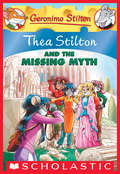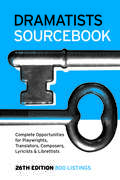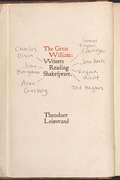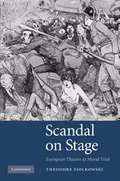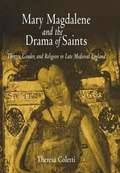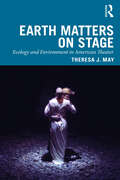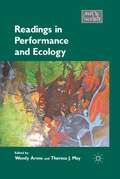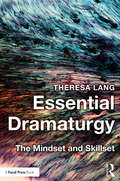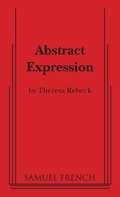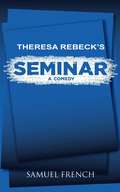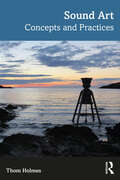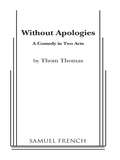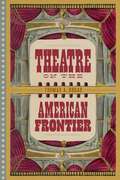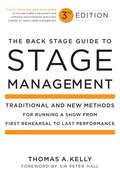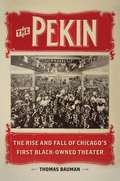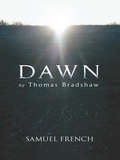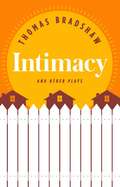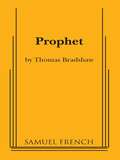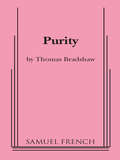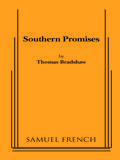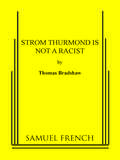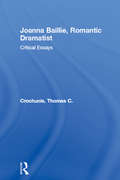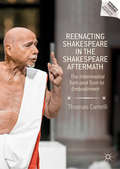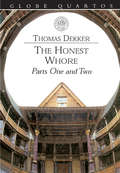- Table View
- List View
Thea Stilton and the Missing Myth: A Geronimo Stilton Adventure (Thea Stilton Graphic Novels #20)
by Thea StiltonJoin Thea Stilton and the Thea Sisters on an adventure packed with mystery and friendship! <p><p> While on vacation in Greece, the Thea Sisters make friends with a company of actors who are rehearsing for a play that's about to open. When an actress sprains her ankle, Colette ends up standing in for her! But suddenly, right before the performance, the lead actor goes missing. Can the mouselets find him in time for the show to go on? <p><i>Advisory: Bookshare has learned that this book offers only partial accessibility. We have kept it in the collection because it is useful for some of our members. To explore further access options with us, please contact us through the Book Quality link on the right sidebar. Benetech is actively working on projects to improve accessibility issues such as these.</i>
Dramatists Sourcebook
by Theatre Communications Group"A treasure trove of sound advice and practical information for the working writer."-Donald Margulies, Pulitzer Prize-winning playwrightCalled "the essential guide to professional opportunities and playscript procedures" by the Dramatist Guild of America, the Dramatists Sourcebook contains more than eight hundred opportunities for playwrights, translators, composers, lyricists, and librettists, including script-submission procedures for more than three hundred professional theaters; more than one hundred prizes; and scores of publishers, fellowships, residencies, agents, and reference publications. This fully revised edition is thoroughly indexed and contains a calendar of submission guidelines and Tony Kushner's "Simple Working Guide for Playwrights."
The Great William: Writers Reading Shakespeare
by Theodore LeinwandThe Great William is the first book to explore how seven renowned writers--Samuel Taylor Coleridge, John Keats, Virginia Woolf, Charles Olson, John Berryman, Allen Ginsberg, and Ted Hughes--wrestled with Shakespeare in the very moments when they were reading his work. What emerges is a constellation of remarkable intellectual and emotional encounters. Theodore Leinwand builds impressively detailed accounts of these writers' experiences through their marginalia, lectures, letters, journals, and reading notes. We learn why Woolf associated reading Shakespeare with her brother Thoby, and what Ginsberg meant when referring to the mouth feel of Shakespeare's verse. From Hughes's attempts to find a "skeleton key" to all of Shakespeare's plays to Berryman's tormented efforts to edit King Lear, Leinwand reveals the palpable energy and conviction with which these seven writers engaged with Shakespeare, their moments of utter self-confidence and profound vexation. In uncovering these intense public and private reactions, The Great William connects major writers' hitherto unremarked scenes of reading Shakespeare with our own.
Scandal on Stage: European Theater as Moral Trial
by Theodore ZiolkowskiNew plays and operas have often tried to upset the status quo or disturb the assumptions of theatre audiences. Yet, as this study explores, the reactions of the audience or of the authorities are often more extreme than the creators had envisaged, to include outrage, riots, protests or censorship. Scandal on Stage looks at ten famous theater scandals of the past two centuries in Germany and France as symptoms of contemporary social, political, ethical, and aesthetic upheavals. The writers and composers concerned, including Schiller, Stravinsky, Strauss, Brecht and Weil, portrayed new artistic and ideological ideas that came into conflict with the expectations of their audiences. In a comparative perspective, Theodore Ziolkowski shows how theatrical scandals reflect or challenge cultural and ethical assumptions and asks whether theatre can still be, as Schiller wrote, a moral institution: one that successfully makes its audience think differently about social, political and ethical questions
Mary Magdalene and the Drama of Saints
by Theresa ColettiA sinner-saint who embraced then renounced sexual and worldly pleasures; a woman who, through her attachment to Jesus, embodied both erotic and sacred power; a symbol of penance and an exemplar of contemplative and passionate devotion: perhaps no figure stood closer to the center of late medieval debates about the sources of spiritual authority and women's contribution to salvation history than did Mary Magdalene, and perhaps nowhere in later medieval England was cultural preoccupation with the Magdalene stronger than in fifteenth-century East Anglia.Looking to East Anglian texts including the N-Town Plays, The Book of Margery Kempe, The Revelations of Julian of Norwich, and Bokenham's Legend of Holy Women, Theresa Coletti explores how the gendered symbol of Mary Magdalene mediates tensions between masculine and feminine spiritual power, institutional and individual modes of religious expression, and authorized and unauthorized forms of revelation and sacred speech. Using the Digby play Mary Magdalene as her touchstone, Coletti engages a wide variety of textual and visual resources to make evident the discursive and material ties of East Anglian dramatic texts and feminine religion to broader traditions of cultural commentary and representation.In bringing the disciplinary perspectives of literary history and criticism, gender studies, and social and religious history to bear on specific local instances of dramatic practice, Mary Magdalene and the Drama of Saints highlights the relevance of Middle English dramatic discourse to the dynamic religious climate of late medieval England. In doing so, the book decisively challenges the marginalization of drama within medieval English studies, elucidates vernacular theater's kinship with influential late medieval religious texts and institutions, and articulates the changing possibilities for sacred representation in the decades before the Reformation.
Earth Matters on Stage: Ecology and Environment in American Theater (Routledge Studies in Theatre, Ecology, and Performance)
by Theresa J. MayEarth Matters on Stage: Ecology and Environment in American Theater tells the story of how American theater has shaped popular understandings of the environment throughout the twentieth century as it argues for theater’s potential power in the age of climate change. Using cultural and environmental history, seven chapters interrogate key moments in American theater and American environmentalism over the course of the twentieth century in the United States. It focuses, in particular, on how drama has represented environmental injustice and how inequality has become part of the American environmental landscape. As the first book-length ecocritical study of American theater, Earth Matters examines both familiar dramas and lesser-known grassroots plays in an effort to show that theater can be a powerful force for social change from frontier drama of the late nineteenth century to the eco-theater movement. This book argues that theater has always and already been part of the history of environmental ideas and action in the United States. Earth Matters also maps the rise of an ecocritical thought and eco-theater practice – what the author calls ecodramaturgy – showing how theater has informed environmental perceptions and policies. Through key plays and productions, it identifies strategies for artists who want their work to contribute to cultural transformation in the face of climate change.
Readings in Performance and Ecology
by Wendy Arons Theresa J. MayThis ground-breaking collection focuses on how theatre, dance, and other forms of performance are helping to transform our ecological values. Top scholars explore how familiar and new works of performance can help us recognize our reciprocal relationship with the natural world and how it helps us understand the way we are connected to the land.
Essential Dramaturgy: The Mindset and Skillset
by Theresa LangEssential Dramaturgy: The Mindset and Skillset provides a concrete way to approach the work of a dramaturg. It explores ways to refine the process of defining, evaluating, and communicating that is essential to effective dramaturgical work. It then looks at how this outlook enhances the practical skills of production and new play dramaturgy. The book explains what a dramaturg does, what the role can be, and how best to refine and teach the skillset and mindset.
Abstract Expressions
by Theresa RebeckAfter a scathing review 15 years ago, a once-celebrated painter faded into impoverished obscurity. Can one chance encounter resurrect this volatile artist from obscurity and re-launch him to overnight success? Theresa Rebeck skillfully compares the gritty urban realities of lives lived on the edge with the capricious intrigues of the uptown gallery scene where fame might just be a matter of who you know and reputations can be bought and sold.
Seminar
by Theresa RebeckNominee! 2012 Drama League Award for Distinguished Production of a Play. In Seminar, a provocative comedy from Pulitzer Prize nominee Theresa Rebeck, four aspiring young novelists sign up for private writing classes with Leonard (JEFF GOLDBLUM), an international literary figure. Under his recklessly brilliant and unorthodox instruction, some thrive and others flounder, alliances are made and broken, sex is used as a weapon and hearts are unmoored. The wordplay is not the only thing that turns vicious as innocence collides with experience in this biting Broadway comedy. "FIVE STARS! Sexy, savvy and uproarious!" - David Cote, Time Out New York
Sound Art: Concepts and Practices
by Thom HolmesSound Art offers the first comprehensive introduction to sound art written for undergraduate students. Bridging and blending aspects of the visual and sonic arts, modern sound art first emerged in the early 20th century and has grown into a thriving and varied field. In 13 thematic chapters, this book enables students to clearly grasp both the concepts behind this unique area of art, and its history and practice. Each chapter begins with an exploration of key ideas and theories, followed by an in-depth discussion of selected relevant works, both classic and current. Drawing on a broad, diverse range of examples, and firmly interdisciplinary, this book will be essential reading for anyone studying or teaching the theory, history, appreciation, or practice of sound art.
Without Apologies
by Thom ThomasComedy / 3m, 3f / Interior / Without apologies to Oscar Wilde, this delightful comedy dares to fill us in on what happened to Gwendolyn, Cecily, Jack and Algernon after the final curtain of 'The Importance of Being Earnest'. It is 1933 and Algy and Gwen have been married and living a cozy middle class life in London for 34 years. In all this time, they have not seen and have had no desire to see Cecily and Jack who is now known as Ernie. Now, Cecily has written to tell Gwen that they are coming to visit. Why after all these years? This question is at the core of the mysterious hilarity that abounds in this boisterous, witty, literate and highly entertaining sequel. / "Razor sharp wit. . . . Sublime entertainment." -The Portland Downtowner
Theatre on the American Frontier
by Thomas A. BogarFor two centuries, nearly all historical accounts of American theatre have focused on New York, Boston, and Philadelphia. As a result, the story of theatre on the frontier consists primarily of regional studies with limited scope. Thomas A. Bogar’s Theatre on the American Frontier provides an overdue, balanced treatment of the accomplishments of the troupes working in the trans-Appalachian West.From its origins in late eighteenth-century Pittsburgh, New Orleans, and Louisville, frontier theatre grew by the close of the nineteenth century to encompass more than a dozen centers of vibrant theatrical activity. Audiences—mainly pioneers struggling with the hardships of establishing a life in the backcountry—enjoyed thrilling melodramas, the comedies of George Colman the Younger and John O’Keeffe, and even the tragedies of William Shakespeare. Theatre companies that ventured into this challenging and unfamiliar territory did so with a combination of daring and determination. Bogar’s comprehensive study brings this neglected history into the spotlight, cementing these figures and their theatrical productions and practices in their rightful place.
The Back Stage Guide to Stage Management, 3rd Edition
by Thomas A. KellyThe Most Widely Used Manual For Aspiring And Veteran Stage Managers - Now Revised and ExpandedThe next best thing to shadowing a Broadway stage manager, this detailed, behind-the-scenes book as been brought completely up to date. First published in 1991, it is widely used and has been lauded as the most comprehensive, educational book on stage management available. From preproduction planning and first rehersals to opening night and final strike, all the essentials of the profession are presented here in a friendly, engaging style.Blending how-to information with anecdotes from his own career, author Thomas A. Kelly explains the entire theatrical process, including:- Organizing all rehearsals and performances- Maintaining the working script, cue sheets, and daily records- Supervising the technical aspects of the show- Running shows outdoors and at other non-theatrical venues- Dealing with performers and crew members on all levelsThis new edition reflects all the latest developments and innovations in the industry and adds a totally new chapter on opera stage management, complete with an in-depth breakdown of the challenges this style of production presents. The text is supported by sample documents, diagrams, and charts that straddle time-honored approaches with what can be generated by today's computer software. All the latest stage machinery is discussed, along with tips on finding employment. This guide remians the first choice for anyone who works in any branch of the profession, whether amateur, educational, or professional.From the Trade Paperback edition.
Dryden: An Essay of Dramatic Poesy
by Thomas Arnold William T. Arnold"Dryden’s Essay of Dramatic Poesy" provides a captivating exploration of the nature and principles of dramatic poetry in this influential work first published in 1668. The web page encompasses not only the titular essay but also features a comprehensive preface by Thomas Arnold, revised by William T. Arnold, offering historical and biographical context along with a summary and analysis of Dryden's key arguments. Dryden's Epistle Dedicatory, addressed to Charles Sackville, adds a personal touch, elucidating the essay's purpose and praising Sackville's contributions to the arts. The main body, "Essay of Dramatic Poesy," unfolds as a lively dialogue among four gentlemen, debating topics ranging from ancient versus modern poets to the rules of drama. Dryden's sharp wit and critical insight shine through with rich examples and references. The inclusion of Dryden's Defence of the Essay, responding to objections raised by Sir Robert Howard, provides a well-rounded perspective, defending his views on rhyme, verse, and dramatic unities with humor and courtesy. This compilation offers a profound glimpse into the world of dramatic poesy and Dryden's enduring literary prowess.
The Pekin: The Rise and Fall of Chicago's First Black-Owned Theater
by Thomas BaumanIn 1904, political operator and gambling boss Robert T. Motts opened the Pekin Theater in Chicago. Dubbed the "Temple of Music," the Pekin became one of the country's most prestigious African American cultural institutions, renowned for its all-black stock company and school for actors, an orchestra able to play ragtime and opera with equal brilliance, and a repertoire of original musical comedies. A missing chapter in African American theatrical history, Bauman's saga presents how Motts used his entrepreneurial acumen to create a successful black-owned enterprise. Concentrating on institutional history, Bauman explores the Pekin's philosophy of hiring only African American staff, its embrace of multi-racial upper class audiences, and its ready assumption of roles as diverse as community center, social club, and fundraising instrument. The Pekin's prestige and profitability faltered after Motts' death in 1911 as his heirs lacked his savvy, and African American elites turned away from pure entertainment in favor of spiritual uplift. But, as Bauman shows, the theater had already opened the door to a new dynamic of both intra- and inter-racial theater-going and showed the ways a success, like the Pekin, had a positive economic and social impact on the surrounding community.
Dawn
by Thomas BradshawDrama / Characters: 2m, 4f, plus 1 male or female character and 1 male voice over / Simple Set / Dawn revolves around Hampton, an abusive alcoholic who has completely alienated his wife and children. Can he stop drinking and make up for the past, even amidst some very dark revelations of incest and pedophilia? Dawn is one father's story of redemption and reconciliation - with a twist. Bradshaw was named Playwright of the year by the theater blog KUL-That Sounds Cool and Dawn was named among the best performances of Stage and Screen for 2008 in The New Yorker. "[Bradshaw's] most daring and mature work to date!" -The New Yorker. "You will enjoy this latest visit to the unsettled world of Thomas Bradshaw, where people misbehave without the cushion of guilt or the filter of psychology. ****4 Stars! Critics' Pick " -Time Out New York. "Bradshaw's best play! It will be a sad statement about the NYC theatergoing public if there is one empty seat in the house for the rest of this show's run." -www.NYTheatre.com.
Intimacy and Other Plays
by Thomas Bradshaw"Bradshaw has proved in play after play that he has a confident vision of the theater that is his own. The politically incorrect plots jump merrily from one outrage to another, never pausing to explain motivation or linger on subtext. His dramas ask: What would happen if every dark urge, lingering resentment and unedited ugly insult that popped into your head came spilling out of your mouth? . . . No playwright applies as ruthlessly Hitchcock's definition of drama as 'life with the boring parts taken out.'"-The New York TimesInterracial couple Jerry and Pat borrow tools from their recently widowed, white evangelical neighbor James, and they even share the same Latino contractor, the mysterious Fred. Everything's suburban bliss until James, after discovering his neighbors' daughter Janet is a budding porn star, shuns the family. But what James doesn't know is that his aspiring-filmmaker son Matthew has other ideas...An outrageous and revealing comedy about race, sex, and familiarity, Intimacy, the newest work by playwright Thomas Bradshaw, premiered Off-Broadway with The New Group in winter 2014. This collection from the fiercely provocative and funny playwright also includes Dawn, Fulfillment, Southern Promises, Job, Strom Thurmond Is Not a Racist, Lecture on the Blues and Purity.Thomas Bradshaw's other plays include The Bereaved, declared a New York Times Critic's Pick and one of the Best Plays of 2009 by Time Out New York; Mary; and Burning. He was hailed as the Best Provocative Playwright of 2007 by the Village Voice.
Prophet
by Thomas BradshawFull Length, Satire . Characters: 4 male, 3 female . Simple settings . A man wakes up one morning and decides he must kill himself. He is angry with himself for not hitting his wife every time she has an independent thought (as Abraham and Moses would have done). After she dies and God reveals to him that he is the new Prophet, the man takes a new wife, dresses her in slave chains, and begins to preach his newfound gospel of male domination. Simultaneously humorous and disturbing, Bradshaw's Prophet explores controversial issues in startling and unexpected ways. . "Fasten your seatbelts. PROPHET, Thomas Bradshaw's lacerating satire,...hurtles from rambunctious mockery to real horror. This is situation satire with a vengeance..."-The New York Times . This play contains scenes of a graphic sexual and violent nature that may not be suitable for all audiences.
Purity
by Thomas BradshawDark Satire. Characters: 5 male, 3 female (Some doubling possible) . Modular sets . In Purity, a refined and prominent African-American English professor's life is turned upside down when a new, 'more black' professor is hired in his department and challenges his authenticity, his marriage to a white woman, and his entire way of life. This way of life consists of literature, booze, cocaine binges, and pedophilia. From realism to fantasy, Purity takes us on a journey from the Ivy League to the ante-bellum South to the fields of Ecuador and back again, ending on a note of shocking violence. . "Thomas Bradshaw's "Purity" lures you with a goofy, comic touch, and he and the game, energetic cast can make your laughs catch in your throat." - The New York Times . "Authentically hard-hitting and provoking...... Thomas Bradshaw wants to use the theatre to poke and prod his audience away from complacency and toward social action... It's work that's designed to make us think and feel after we leave the theatre; that's got to be a good thing." - Nytheatre.com . "A whip smart exercise in sublime discomfort..... Squarely confronting social taboos, Purity unabashedly raises incredibly relevant questions about race in contemporary America -- but don't expect Bradshaw to offer any answers. Instead he opens a Pandora's box of power, exploitation, and fantasy, handing it over to us to make of it what we will." - Backstage . "Purity finally achieves the trifecta of what it had been after all along - it frightens, it provokes and it causes contemplation. For those who have pushed through the more repellent moments of Purity, there is something satisfying here." - American Theatre Web . "Vicious and harrowing... a profoundly disturbing play" -New York Sun. This play contains scenes of a graphic sexual and violent nature that may not be suitable for all audiences.
Southern Promises
by Thomas BradshawDrama / Characters: 6m, 2f, with doubling / Simple Set / When the master of the plantation dies, he wills his slaves to be freed, but his wife doesn't think that good property should be squandered. Pandemonium ensues. The play is inspired by the true story of Henry Box Brown who escaped to the north by mailing himself in a box. Southern Promises provides a unique portrait of the old south. Bradshaw was named Playwright of the year by the theater blog KUL-That Sounds Cool and Southern Promises was named among the best performances of Stage and Screen for 2008 in The New Yorker. "Slowly, almost single-handedly, a twenty-eight-year-old black playwright named Thomas Bradshaw has been taking on the idea of race in the theatre. At the same time, he has sliced open the pretensions of the white avant-garde with a wittily glistening axe. In his new play, Southern Promises (at Performance Space 122), one can catch a glimpse of Bradshaw's anarchic gifts." -The New Yorker. "It's a striking, challenging piece that studies the abuse of power and the liquidity of morality." -NYTheatre.com. "Likely to leave you speechless"-The New York Times. "Thomas Bradshaw's deeply twisted, coolly brutal period drama Southern Promises" -Village Voice.
Strom Thurmond Is Not A Racist
by Thomas BradshawSatire / 5m, 2f (doubling, flexible casting possible) / Modular sets / Inspired by a true story, Strom Thurmond is Not a Racist is an absurdist look at the life of Senator Strom Thurmond. After fathering a child with his black maid as a young man, the extremely white Strom Thurmond became one of the country's greatest segregationists; all the while playing daddy to his bi-racial daughter Essie Mae Washington Williams. How could someone live such a duplicitous life? It happens. Winner of The American Theater Coop's National Playwriting Contest in 2005. Published with CLEANSED. / "Tom Bradshaw's most important contribution to society is snatching narrative and its elements back from the clutches of the ordinary" -- Richard Maxwell, Playwright and Director
Joanna Baillie, Romantic Dramatist: Critical Essays
by Thomas C. CrochunisThis superb collection of new essays offers a unique insight into the work of a leading women dramatist of the Romantic era. Contributors offer: *contextual material for those new to Baillie's work *examinations of the relationships between her plays and the philosophical and scientific writing of the era *discussion of Baillie's theatrical methods *extended interpretations of individual plays. Ending years of neglect of Baillie's crucial work, this volume is essential reading for those working on Romanticism, women's writing, or drama of the late eighteenth and early nineteenth centuries.
Reenacting Shakespeare in the Shakespeare Aftermath: The Intermedial Turn and Turn to Embodiment (Reproducing Shakespeare)
by Thomas CartelliIn the Shakespeare aftermath—where all things Shakespearean are available for reassembly and reenactment—experimental transactions with Shakespeare become consequential events in their own right, informed by technologies of performance and display that defy conventional staging and filmic practices. Reenactment signifies here both an undoing and a redoing, above all a doing differently of what otherwise continues to be enacted as the same. Rooted in the modernist avant-garde, this revisionary approach to models of the past is advanced by theater artists and filmmakers whose number includes Romeo Castellucci, Annie Dorsen, Peter Greenaway, Thomas Ostermeier, Ivo van Hove, and New York’s Wooster Group, among others. Although the intermedial turn taken by such artists heralds a virtual future, this book demonstrates that embodiment—in more diverse forms than ever before—continues to exert expressive force in Shakespearean reproduction’s turning world.
The Honest Whore: With The Humours Of The Patient Man, And The Loving Wife (classic Reprint) (Globe Quartos)
by Thomas DekkerFirst Published in 1999. Routledge is an imprint of Taylor & Francis, an informa company.
